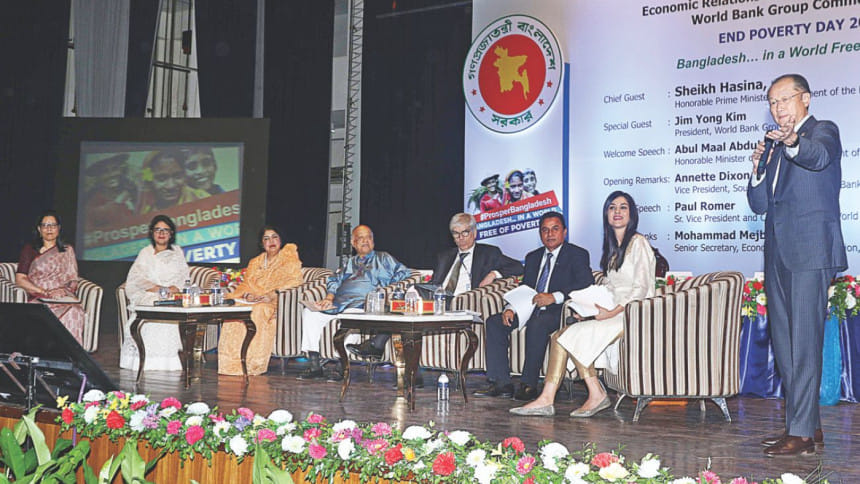Bangladesh is a model for poverty reduction: WB chief

World Bank President Jim Yong Kim yesterday heaped praises upon Bangladesh, its people and leadership for becoming a model for poverty reduction despite being saddled with a long list of hardships.
"Bangladesh has shown the world that a long list of hardships can be overcome," Kim said at a discussion at Osmani Memorial Auditorium in Dhaka.
The Economic Relations Division and the WB jointly organised the discussion titled -- "End Global Poverty by 2030: Sharing Bangladesh's Experience".
"In fact, its people have shown that innovation, commitment, setting goals and visionary leadership can accomplish feats that few dared to imagine. I believe that Bangladesh can continue to build on this record and can end extreme poverty by 2030."
Kim affirmed the multilateral lender's strong commitment to Bangladesh. "We will work with you to get to the future, no matter what it may bring."
Bangladesh has already invested much in people -- way ahead of everyone else. "You have taught us how to keep children from dying of diarrhoea, how to treat tuberculosis and how to improve women's healthcare."
"If you take that foundation and invest more in your people, no matter what comes at you in the future, you would be ready for it."
Kim said he visited Ghana last year on the occasion of World Poverty Day, where he met a garment factory owner.
The factory owner was so proud that she had increased her productivity by 72 percent and this was thanks to Bangladeshi advisers.
"This is a good thing. They have not yet reached the level of productivity as Bangladesh -- maybe they will someday."
The WB is looking for innovations, better ideas and great achievement all over the world and Bangladesh is a source of many important innovations, he said.
Kim also talked about South Korea, where he was born, and drew similarities in its development journey with Bangladesh.
The WB had declared South Korea as a hopeless country in 1959 -- the year Kim was born. The country did not qualify for loans from the multilateral lender because it would not be able to pay them back.
What happened in Korea is someway similar to what is happening in Bangladesh now: investing in people, increasing productivity and investing in manufacturing, said Kim, an US national.
He said Korea is however no less nervous today than it was 40 years ago about what the next stage of economic development will be.
"We, the World Bank Group, are here because we want to go through that collective, productive paranoia with you."
"We will provide financing. But think of us as partners in your paranoia: your partners are looking into the future wondering what is going to be next."
Earlier, Kim spoke at the opening ceremony of "End Poverty Day", which was attended by Prime Minister Sheikh Hasina as chief guest.
Bangladesh got many of the basics right in its efforts to end extreme poverty, he said.
From 2000, the economy has been growing at 6 percent on average every year -- and that growth has lifted millions out of poverty.
New data from the WB, released earlier this month, showed that 20.5 million Bangladeshis escaped from poverty between 1991 and 2010.
In percentage terms, the poverty rate dropped to 18.5 percent in 2010 from 44.2 percent in 1991.
Kim said Bangladesh has much work to do though: it had 28 million poor in 2010, as per the latest estimates from household surveys.
Bangladesh has recognised decades ago that empowering women is essential to ending extreme poverty. "Your leaders arrived at the logical conclusion that countries can never reach their full economic potential if half the population is not fully participating," he added.
Another lesson, Kim said, the WB draws from Bangladesh sounds obvious, but far too few countries actually do it -- multiple partners are needed to accelerate progress in ending extreme poverty.
"Large non-governmental organisations and private sector companies -- including Brac and Grameen Bank, which are known around the world -- brought microfinance, investments in female-owned small businesses, and other initiatives to empower poor people." At the panel discussion, Finance Minister AMA Muhith said the government decided in 2009 to ensure adequate investment in social sectors.
The government has invested in rural areas and in infrastructure and created jobs, he said. Planning Minister AHM Mustafa Kamal supported Muhith's comment, adding that the government does not differentiate between rural and urban areas.
The government is putting more emphasis on developing small and medium enterprises as they provide opportunities to women to transform their lives for the better, said Shirin Sharmin Chaudhury, speaker of parliament. Paul Romer, chief economist of the WB, said it is said that to sustain growth an economy needs less government.
"The government can get in the way, and the economy does need less of this, but in Bangladesh, and in many similarly situated countries, the real problem is too little of the type of government that the market needs to keep generating more sophisticated jobs."
Only the government can ensure that everyone has the opportunity to learn from new ideas. As an economy develops, providing this type of access becomes ever more challenging, he added. Over the last four decades, non-governmental and civil society organisations and voluntary groups have complemented what the government had been doing in areas such as health, education and women's empowerment, said Farah Kabir, country director of ActionAid Bangladesh.
"Through this multisectoral partnership we complemented the government," she added.
Despite innumerable challenges, the country is in an indomitable place thanks to the government's emphasis on infrastructure development and policy support, said Rubana Huq, chief executive officer of Mohammadi Group.

 For all latest news, follow The Daily Star's Google News channel.
For all latest news, follow The Daily Star's Google News channel. 



Comments